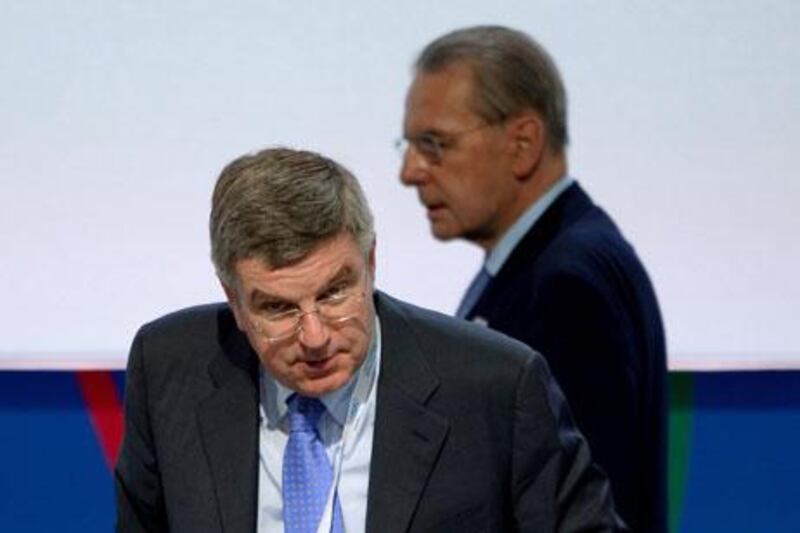The man viewed as the favourite to be voted in as the new president of the International Olympic Committee (IOC) has brushed off allegations in his home country Germany over his conduct during his days as a fencer.
Thomas Bach, who won a gold medal in 1976 as part of the foil team, is the front-runner to succeed Jacques Rogge as the most powerful man in world sport.
A documentary on German TV has accused Bach of wearing a wet glove to fool the electronic scoring system.
A spokesman for Bach said the claims were "nonsense".
Bach is standing against five other men for the position – Sergei Bubka (Ukraine), Richard Carrion (Puerto Rico), Ser Miang Ng (Singapore), Denis Oswald (Switzerland) and C-K Wu (Taiwan).
Meanwhile, Britain's IOC member Adam Pengilly has revealed that a number of athletes pleaded with him not to vote for Madrid and to a lesser extent Istanbul for the 2020 Olympic host city due to doping scandals.
Tokyo won the vote on Saturday with a comfortable majority and Pengilly asked probing questions to both its rivals.
He said that Madrid failed to give a clear answer over the Operation Puerto scandal, where a court has ordered a number of suspect blood bags belonging to athletes be destroyed rather than tested.
The former skeleton racer, who is on the IOC Athletes Commission, said: "I asked anti-doping questions because those needed to be answered by both the Madrid and Istanbul bids and on Fukushima by Tokyo.
"A number of athletes, most of them British, had asked me not to vote for Madrid because of the Puerto situation.
"I asked what would they say to those athletes who were potentially cheated out of success by those anonymous bags and no I didn't get a clear answer on that."
Pengilly admitted that he had to tread a fine line between asking tough questions and not upsetting other IOC members.
"There is that potential and I am aware I have to be a bit delicate if I upset my fellow members - otherwise my relationship and influence would be diminished," he said.
"So there is a balance to be had in representing the people who elected me and being honest and frank and getting clear answers when we need them but doing it in a way that's not going to upset them."
Rio organisers under fire
Rio's preparations for the 2016 Summer Olympics came under fire from the IOC members for the first time in public on Sunday.
Carlos Nuzman, the Brazilian IOC member, was put under pressure after presenting an update on Rio's progress where he insisted they would be ready on time but that a lot of work still lay ahead.
Nawal El Moutawakel, the IOC Coordination Commission chief, conceded while progress had been made there was room for improvement.
The 51-year-old Moroccan, the inaugural winner of the women's Olympic 400m hurdles title in 1984, said the organisers should learn lessons from the protests that took place during Brazil's hosting of the Confederations Cup earlier this year.
Hundreds of thousands demonstrators turned out over weeks to protest higher mass transit fares and call for better public services, including transportation, and complained about the vast investment being made in the World Cup next year and the Olympics.
"Over recent months, the social and political environment and operations have significantly changed," said El Moutawakel, who visited Rio with her fellow members of the Commission last week.
"There is a need, more than ever before, that all stakeholders need to work together.
"Key decisions need to be made collectively and communicated with one voice."
El Moutawakel, a former sports minister in Morocco, said that she still felt Rio could put together a great Games.
"We remain confident Rio and Brazil have the resources and the energy and ambition to deliver a memorable Olympic Games in 2016."
Kevan Gosper, the veteran Australian IOC member and head of the Press Commission, was not so guarded and, admitting it was not easy as Nuzman was a 'friend of his', warned his colleague things needed to improve quickly in terms of getting their message across to the people of Rio.
"I'm still concerned with the delay related to your press operations. It took you three-and-a-half years to appoint a media chief," said the 79 year old, who won a silver medal in the 4x400 metres relay at the 1956 Olympics in Melbourne.
"You simply have to keep your public aware about what's happening.
"If the community doesn't get it, you'll have a repeat of what you've had [protests]."
Their concerns echoed those of some other IOC members who said that they had voted for Tokyo ahead of Istanbul to host the 2020 Games on Saturday because of the slow progress being made by Rio and did not want to have to endure the possibility of a repeat of that for the following edition.
Follow us
[ @SprtNationalUAE ]





